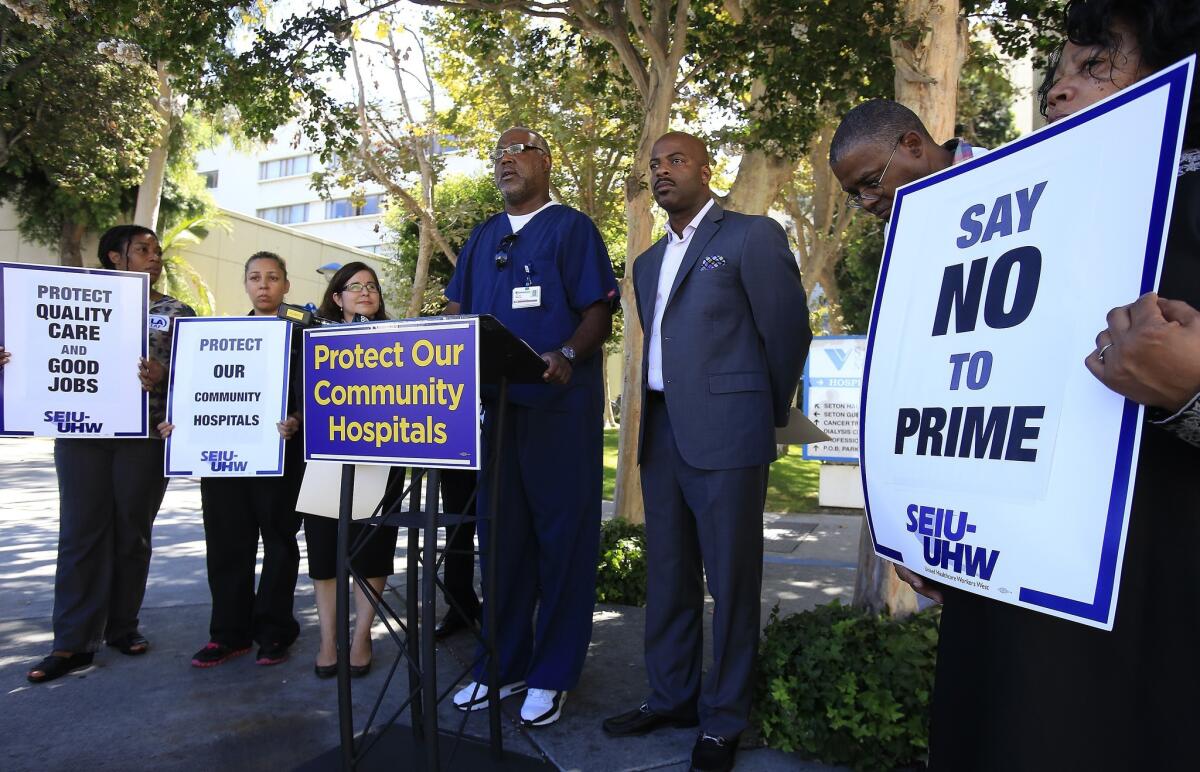Prime Healthcare’s bid to buy 6 Catholic hospitals scrutinized

Atty. Gen. Kamala D. Harris is jumping into a heated battle over the purchase of six struggling nonprofit Catholic medical centers in California by the fast-growing Ontario hospital chain Prime Healthcare Services Inc.
The sale of the nonprofit Daughters of Charity Health System, which includes St. Vincent and St. Francis medical centers in Los Angeles County, to profit-making Prime requires Harris’ approval.
Supporters and opponents are gearing up to promote their views at a series of public hearings that begin Monday in Lynwood and run through Friday.
Prime’s offer has the support of Daughters of Charity and the California Nurses Assn., a union that represents 1,800 Daughters of Charity nurses.
But the sale is hotly opposed by the SEIU-United Healthcare Workers West, the Roman Catholic chain’s largest union and a longtime, outspoken critic of Prime’s business practices.
As part of the deal, Prime agreed to pay off more than $400 million of Daughters of Charity’s tax-exempt bonds and other debt, and the company would assume nearly $300 million of pension liability.
Prime also promised to keep the six hospitals open for at least five years. The Ontario-based chain has said it would retain most of the hospitals’ 7,600 jobs but would make some cutbacks in middle management.
The attorney general’s office is holding hearings in each of the communities served by the Daughters of Charity hospitals: Los Angeles, Lynwood, San Jose, Gilroy, Moss Beach and Daly City. A decision is expected in early February.
Prime’s biggest obstacle is well-organized opposition from SEIU-United Healthcare Workers West, which argues that Prime puts profit first at the expense of patient care.
The union has spent years battling Prime, conducting public protests and issuing news releases that attack the hospital chain for its billing practices, litigious history and what the union calls a high rate of admitting patients who visit its emergency rooms.
“They have a long track record of providing care in a way that drives up costs and reduces quality,” said Dave Regan, president of the SEIU-United Healthcare Workers West. “They’re not a good citizen in the healthcare community.”
The union, which represents about 2,600 of the chain’s 7,600 employees, has urged Harris to reject the sale. It supports a competing offer, previously rejected by Daughters of Charity, from private equity firm Blue Wolf Capital.
Prime, which operates 29 hospitals in California and eight other states, is owned by Dr. Prem Reddy, a cardiologist who shaped the company’s growth through a series of acquisitions of troubled hospitals during the last decade.
Reddy said his company has never closed a hospital and has managed to turn money-losing hospitals into profitable ones by cutting middle management and negotiating favorable reimbursement contracts with insurers.
That experience makes Prime well-suited to manage the six hospitals, Reddy said. He also points to support of the purchase from the California Nurses Assn.
“I hope and pray the attorney general looks into what went into this decision-making process and, more importantly, what will be the consequences if she denies this: Six hospitals will go into bankruptcy,” Reddy said.
If Harris approves the Daughters of Charity acquisition, Prime will become the fifth-largest hospital company in the United States, based on revenue.
The attorney general has approved two past purchases by Prime and rejected two others, including the company’s 2011 attempt to acquire Victor Valley Community Hospital in Victorville.
In rejecting the Victor Valley deal, Harris noted Prime’s “disturbing business model” and said the takeover was “not in the public interest.”
One concern noted by critics is an ongoing investigation into Prime’s billing practices by the Justice Department. Prime has acknowledged the investigation but said it expects federal investigators will conclude that “our hospitals follow all state and federal regulations and laws.”
As part of the state’s review of the six-hospital purchase, the attorney general’s office hired a healthcare consultant to review the deal. The consultant’s report, released in December, made no definitive recommendation on the proposed purchase but suggested that Prime should be required to keep the hospitals open for 10 years instead of the five years it has promised.
Michael Sarian, Prime’s president of hospital operations, said the recommendation did not sound like a deal breaker, though it is unusual.
“Actually, we have no issue with it, because we have no intention to close the hospitals,” Sarian said. “Every hospital we’ve purchased, we’ve maintained. To put it in writing, however, is out of the ordinary.”
Robert Issai, chief executive of Daughters of Charity, is lobbying hard for Prime’s approval. Prime was chosen from more than 100 candidates, he said, in large part because of its promise to assume nearly $300 million in pension liability for 17,000 current and former employees. Prime also has proved capable of rescuing troubled hospitals, Issai said.
“The pensions were a No. 1 focus for us,” Issai said. “It was really obvious they were a great choice.”
Twitter: @spfeifer22
More to Read
Inside the business of entertainment
The Wide Shot brings you news, analysis and insights on everything from streaming wars to production — and what it all means for the future.
You may occasionally receive promotional content from the Los Angeles Times.











